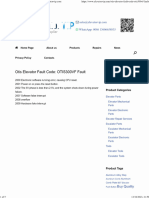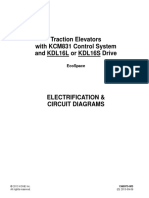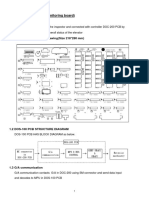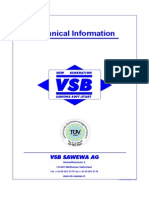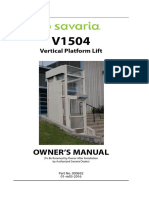0 ratings0% found this document useful (0 votes)
714 views18 pagesDrive Configuration
Para elevadores KONE
Uploaded by
Mario Enrique Morales LemusCopyright
© © All Rights Reserved
We take content rights seriously. If you suspect this is your content, claim it here.
Available Formats
Download as PDF or read online on Scribd
0 ratings0% found this document useful (0 votes)
714 views18 pagesDrive Configuration
Para elevadores KONE
Uploaded by
Mario Enrique Morales LemusCopyright
© © All Rights Reserved
We take content rights seriously. If you suspect this is your content, claim it here.
Available Formats
Download as PDF or read online on Scribd
You are on page 1/ 18
INO EA 0
‘US 2017000873081
cu») United States
2) Patent Application Publication co) Pub. No.: US 2017/0008730 Al
KATTAINEN et al. (43) Pub. Date: Jan. 12, 2017
(4) METHOD AND APPARATUS FOR Publication Classification
AUTOMATIC ELEVATOR DRIVE cn mel
ean Boon 130 (2006.01)
(71) Applicants:Arl KATTAINEN, Hyvinkaa (FD) (2) Us.c,
Jyrki LAAKSONHIEIMO, Ilyvinkaa crc B66B 1304 (201301)
ey
on ABSTRACT
(72) Inventors: Ari KATTAINEN, Hyvinkss (PD;
Jyrki LAAKSONHEIMO, Hyvinksa The invention relates to a method and an apparatus the
@ invention is method for automatic configuration of aa
levator drive in a traction clevator comprising an clevator
(73) Assignee: Kone Corporation, Helsinki (1) ‘ar, a counterweight, tration sheave, an eletrical motor
and a plurality of elevator ropes arranged to hoist the
21) Appl. Now 187274149 levator car in response to the electrical motor rotating the
traction sheave. The method comprises obtaining a phrality
(22) Filed: Sep. 23, 2016 of electrical motor parameters from a memory associated
‘with the electrical motor. drive computer unit determines
Related U.S. Applicaton Data 3 roping ratio ofthe elevator by deving the elevator 8
(63) Contination of aplication No, PCT/F12018°050208, distance base on elevator position seasor information and
filed on Mar 25,2015, detersines a plurality of tongue vals required to hoist the
elevator wilh a preelined staring acceleration when the
0) orsign Application Priority Data elevator ca is loaded with respective plurality of diferent
Toads. The torque vahies per eich load are stored 10
Mar. 26,2014 (EP) 1617704 memory of the dive comper Unit
a0
1 Lip pm 8, aap
TOWERTER oy
| [wax || peo
rare ut wa
soy HWE E
te
ie
102
Patent Application Publication Jan. 12,2017 Sheet 1 of 6 US 2017/0008730 Al
132
CONVERTER
MATRIX
734.
FIG.1 162
Patent Application Publication Jan. 12,2017 Sheet 2 of 6 US 2017/0008730 Al
226
206 | 228
|
208
Uy 222
Hh | 4 f204
20246 230 2:
5 [200 1220
= 224
FIG. 2A FIG, 28
248
258 248 260
248
252-4
250) 256
J
faz 24
244 | 240
FIG. 2c
Patent Application Publication Jan. 12,2017 Sheet 3 of 6 US 2017/0008730 Al
Y-@XIs
Strain
gauge
reading
X-axis
;
Torque to apply
FIG. 3
Patent Application Publication Jan. 12,2017 Sheet 4 of 6 US 2017/0008730 Al
Sa f@
rt .
fo}
oO
410 J|
108A 1088 }108C] 108D
114A 114B 114C 114D
FIG.4
Patent Application Publication Jan. 12,2017 Sheet Sof 6 US 2017/0008730 Al
METHOD FOR AUTOMATIC.
ELEVATOR DRIVE CONFIGURATIOI
OBTAINING ELECTRICAL MOTOR
PARAMETERS FOR AMEMORY OF THE MOTOR
500
502
TRANSMITTING FIRST SIGNAL TO ROTATE A
TRACTION SHEAVE A PREDEFINED DISTANCE
¥
RECEIVING A SIGNAL INDICATING AN ACTUAL ]°™
DISTANCE TRAVELLED BY AN ELEVATOR CAR
¥ 506
DETERMINING A ROPING RATIO OF THE
ELEVATOR BY COMPARING THE DISTANCE
TRAVELLED TO THE PREDEFINED DISTANCE
508
¥
READING A WEIGHT FROM ALOAD WEIGHING
DEVICE
DETERMINING A TORQUE REQUIRED TO LIFT aus
THE ELEVATOR CAR HAVING THE WEIGHT
WITH A PREDEFINED STARTING ACCELERATION
STORING THE TORQUE REQUIRED INA aa
MEMORY OF A DRIVE COMPUTER UNIT IN
ASSOCIATION WITH THE WEIGHT
FINISH
FIG. 5
Patent Application Publication Jan. 12,2017 Sheet 6 of 6 US 2017/0008730 Al
METHOD FOR MANUFACTURING
AND INSTALLING AMOTOR
DETERMINING ELECTRICAL MOTOR
PARAMETERS USING TESTING
v 602
STORING THE PARAMETERS DETERMINED
TO AMEMORY
600
¥
INSTALLING THE MEMORY WHICH STORES THE ee
PARAMETERS TO THE ELECTRICAL MOTOR
606
INSTALLING THE ELECTRICAL MOTOR TO. ir
ATRACTION ELEVATOR
608
CONNECTING A COMMUNICATION CHANNEL
BETWEEN THE MEMORY AND ADRIVE
COMPUTER UNIT
POWERING ON THE ELEVATOR AND THE DRIVE | -°10
COMPUTER UNIT
¥
DETERMINING A PLURALITY OF ELEVATOR 612
PARAMETERS REQUIRED TO DRIVE
THE ELEVATOR USING THE ELECTRICAL
MOTOR PARAMETERS FROM THE MEMORY
FINISH
FIG. 6
US 2017/0008730 AI
METHOD AND APPARATUS FOR
AUTOMATIC ELEVATOR DRIVE,
‘CONFIGURATION
[0001] This application is a continuation of PCT Interna-
tional Application No, PCT/FI2015(0S0204 which bas an
International ling date of Mar. 25,2015, the entire contents
‘of which are incorporated herein by reference.
BACKGROUND OF THE INVENTION
0002)
[0003] The invention relates to elevators, elevator instal-
Jation and a method andl an apparatus for automatic elevator
drive configuration,
10004} Description of the Related Art
10005] An important part of elevator installation is the
‘configuration ofthe elevator drive. The elevator drive con-
trols power supply toa elecrical motor and brakes of the
‘elevator ane! thas affeets the lifting regarding, for example,
‘acceleration, deceleration, speed and height lifted or low”
ered.
10006] The elevator drive must be conligured appropei-
ately following installation of elevator roping, counter
‘weight and elevator ear in an elevator shaft to ensure safe
‘comfortable and conect operation of the clevator. The
‘configuration of the elevator drive comprises specifying 8
umber of parameters to be stored in # memory associated
ith the elevator drive, Some ofthe parameters are ass
ted with properties ofthe elevator electrical motor such as
hominal torque, nominal current, source voltage, input fre-
‘quency and acceleration current, whereas some of the
paranieters are associated with the clevatoe generally suchas
oping ratio and weights of the elevator car and the coun-
terweight. Among the parameters associated with the motor
are also parameters related o integral part of the motor sack
as troction sheave and brakes. Regarding the traction sheave
itis important to know the diameter of the traction sheave so
that supplying frequeney of the motor and tonue (© be
‘applied to the ropes by the motor may be detennined,
Regarding the brakes its important to know the current and
vollage to be supplied to the brakes to keep the brakes open
and the time i akes to apply the brakes.
10007] In prior art the configuration of elevator drive has
boon performed wsing. user interface that is eommunica-
tively connected to an elevator drive unit, The use interface
allows the manual entry of each separate parameter, The
parameters may be superficially checked for range errors
While entry by the user interface, but there is no actual
automatic checking repanting the levator machinery actu
ally installed, The parameters to be entered are read by the
penn performing the installation from such sources as the
hameplate of the electrical motor.
10008] The configuring of the elevator drive is @ process
that requires precision and takes time. Configuration errors
may cause damage tothe elevator when the elevators tested
following the configuration. Configuration may take, for
‘example, one whole day fora person performing the instal
10009] Therefore, it would be beneficial i elevator drive
pramcters ould be automatically determined so that need
Jor manual parameter entry would be eliminated.
Field ofthe Invention
Jan. 12, 2017
SUMMARY OF THE INVENTION
[0010] According to an aspect ofthe invention, the inven-
tion is a method for automatie configuration ofan elevator
rive in a tration elevator comprising an elevator car, a
counterweight, a traction sheave, an electrical motor and a
plurality of elevator ropes arranged to hoist the elevator car
Jn response to the electical motor rotating the traction
sheave, the method comprising: obtaining, by a dive com-
puter unit of the elevator, a plurality of electrical motor
parameters via a communication channel Irom « memory
associated with the electrical motor, transmitting, by the
rive computer unit, a fist signal causing the electrical
‘motor Io rotate the traction sheave a predefined distance
following the obtaining of the pluraty of the eleetsical
‘motor parameters; receiving, by the drive computer unit, @
fist measurement signal indicating a distance travelled by
the elevator ear in response tothe rotating of the traction
sheave the predefined distance, the fist respoase signal
being received from atleast one ofan accelerometer of the
elevator car and a position sensor of the elevator car
determining, by the drive computer unit, roping ratio ofthe
elevator by comparing the distance travelled 10 the pre-
Sefined distance: reading. by the drive computer wnt, 2
plurality of weights from a load weighing device comin
Bicaively connected to the drive computer unit during
plurality of respective tess, the elevator car being lowed
‘uring the plurality of tess with a plurality of respective test
‘weights, the test weights being different, the reading being
performed follsving the determining of the roping rato, the
plurality of weights comprising at least one of a weight of
fhe clevator ear and weight of a load in the elevator car
termining, by the drive computer unit,» plurality of
respective tongue values for the plurality of respective
‘weighis read during the plurality of tests, the plurality of
torgue values being required to be applied by the eleteical
‘motor in order to Tift the elevator ear with a prodefined
starting oeceleration, the determination being performed
based on a plurality oF second measurement signals received
‘rom at least one of an aecelerometer ofthe elevator ear and
8 position sensor of the elevator ear, the plurality of second
peasurement signals indicating an actual acceleration ofthe
elevator car; and recording t a memory of the drive
computer unit, the pluniity of respective tonyue values
determined for the plurality of weights read, the plurality of
Torque Values being associated in the memory with the
plurality of respective weights.
[O11] Acconting toa futher aspect ofthe invention, the
invention is a method for manufacturing and installing
‘motor of a traction elevator, the method comprising: doter-
ining « pluniity of parameters of an electrical motor
during a testing of the electrical motor, the plurality of
parameters comprising at least one of a serial number, a
‘nominal torgus, a nominal curont, a resistance, a reactance,
a source volage, a voltage, an acceleration current an input
frequency, @ nominal input frequency, a nominal angular
velocity, @ torque graph, a traction sheave diameter, a
trvotion sheave radius, a number of magnetic dipoles, a
brake voltage, a brake current, a brake current decay ime,
brake current half-life, an encoder type, a number of pulses
of the encoder and a gear ratio of the electrical motor;
storing the plurality of parameters of the electrical motor
etermined to a memory: installing the memory to the
tletrical motor: installing the electrical motor inthe traction
elevator, following the installing of the memory to the
US 2017/0008730 AI
‘eleetical motor; connecting a communication channel
between a drive computer unit and the memory comprising
the plurality of electrical motor parameters, following the
instilling ofthe electrical motor; powering on the elevator
‘andthe drive eomputee unit; and determining. plurality of
‘levator parameters required in driving the elevator correctly
by the drive computer unit, the plurality of elevator param
‘ters being determined using the plurality of parameters of
an electrical motor, in response to the powering on of the
‘levator and the drive computer ust.
[0012] According to 8 further aspect of the invention, the
invention is an apparatus comprising a processor, and @
‘memory storing instiction that, when executed, cause the
‘elevator apparatus to obtain a plurality of electrical motor
Pramcters via a communication channel from a memory
‘associated with an electrical motor, to transmit fist signal
‘causing the electrical motor to rotate a traction sheave of a
‘elevator predefined distance, following the obtaining ofthe
plurality ofthe electrical motor parameters, to receivea frst
‘measurement signal indicating a distance traveled by a car
‘of an elevator in response to the rotating of the traction
sheave the predefined distance, the first response signal
being received fom at least one of an accelerometer of the
‘levator ear and a postion sensor of the elevator ear, t0
determine « roping ratio of the elevator by comparing the
distance tavelled to the predefined distance, to read 3
plurality of weights ofthe elevator car from load weighing
‘device communicatively connected to the drive computer
unit during a plurality of respective tests, the elevator car
being loaded during the plurality of tests witha plurality of
respoctive test Weights, the test Weights being different, the
reading being performed following, the determining of the
oping ratio, to determine a plurality of respective torque
values for the plurality of respective elevator car weights
read during the plurality of tests, the plurality of torque
values being required to be applied by the electrical motor
in order Io lif the elevator car with @ predefined staring
acceleration, the determination being performed! based on &
phurlity of second measurement signals received from at
feast one of an accelerometer of the elevator car and 2
position seusor of the elevator ear, and to recon to
memory of the drive computer unit, the plurality of tomue
values determined for the plurality of elevator car weights
read, the plurality of torque values being associated in the
memory with the plurality of elevator ear weights
[0013] According to a further aspect of the invention, the
Invention is an apparatus, the apparatus comprising: means
{or obtaining plurality of electrical motor parameters via &
‘communication channel from 3 memory associated with the
‘eleccial motor, means for trnsmiting first signal causing
the eletrical motor to rotate a traction sheave of an elevator
‘a predefined distance, following the obiining ofthe plural
ity ofthe electrical motor parameters; means for receiving &
first measurement signal indicating a distance travelled by
the elevator ear in response to the rotating of the traction
sheave the predefined distance, the first response signal
being received from at least one of an accelerometer of the
‘elevator ear anda position sensor of the elevator ear; means
or determining roping ratio of the elevator by comparing
the distance travelled tothe predefined distance; means for
reading a plurality of weights from a load weighing device
‘communicatively eonnected tothe drive computer unit dur-
ing a plurality of respective tests, the elevator car being
Joaded during the plurality of tests with a plurality of
Jan. 12, 2017
respoctve test weights, the test weights being different, the
reall being performed following the determining of the
roping ratio, the plurality of weights comprising at least one
fof a Sight of the elevator car and weight of load in the
elevator ear; mean for determining a plurality of respective
torque values for the plurality of respective weights read
during the plurality of tests, the plurality of torque valves
being required to be applied by the electrical motor in order
‘oli the elevator car with a predefined starting acceleration,
the determination being performed based on a plurality of
second! measurement signal received from at least one of an
‘acelerometer of the elevator ear and a position sensor oF the
levator ear, the plurality of second measurement signals
indicating an aettal aoceleraion of the elevator ear: and
‘means for recording to 3 memory of drive computer unit,
the plurality of respective torque values determined for the
plurality of weights read, the plurality of tongue valves being
associated in the memory with the plurality of respective
weights
[014] According toa further aspect ofthe invention, the
invention is # eompter program comprising code adapted to
cause the following when executed on a data-processing
system: obtaining, bya drive computer unit ofthe elevator,
plurality of electrical motor parameters via communica
tion channe! from a memory associated with an eletrical
‘motor, transmitting, by the dive computer unit, first signal
‘causing the elecrical motor to rotate a tition sheave of aa
levator predefined distance, following the obtaining ofthe
plurality of the electrical motor parameters: receiving, by the
‘rive computer unit, a frst measurement signal indicating a
distance travelled by an elevator car in response to the
rotating of tration sheave the predefined distance, the frst
response signal being received ffom at least one of an
accelerometer of the elevator car and a position sensor ofthe
levator cart determining, by the drive computer unit, «
rmping ratio of the elevator by comparing the distance
tnuvelled to the predefined distance; reading. by the drive
computer unit, plurality of weights from a foad weighing
evice communicatively connected to the drive computer
‘unit during a plurality of respective tet, the elevator ear
being loaded during the plurality of tests with a plurality of
respoctve test weights, te test weights being different, the
reading being performed following the determining of the
roping ratio, the plurality of weights comprising a least one
‘of a Weight of the elevator car and weight of load in the
levator ear, dotermining, by the drive computer unit, a
plurality of respective torque values for the plurality of
respoctive weights read during the plumlity of tests the
plurality of true values being required to be applied by the
flecrical motor in onder to lilt the clevator car with
predefined stating acceleration, the determination being
performed based on a plurality of second measurement
‘Signals received from atleast one of an accelerometer ofthe
elevator car and a position sensor of the elevator ea, the
plurality of second measirement signals indicating an actual
Acceleration ofthe levator car; and reconding to a memory
‘ofthe drive computer unit, the plurality of respective torque
values determined for the plurality of weights read, the
plurality of torque values being associated in the memory
‘with the plurality of respective weight
[0018] According toa further aspect ofthe invention, the
invention is method and an apparatus for automate eon-
figuration of an elevator drive in a traction elevator com
prising an elevator car, a counterweight, traetion sheave, an
US 2017/0008730 AI
‘electsical motor and a plurality of elevator ropes aeranged (0
hoist the elevator car in response to the electrical motor
rovating the traction sheave, The method! comprises obtain
ing, by a drive computer unit, a plurality of electeial motor
paranieters from a memory associated with the eletical
olor over a communication chunael connecting the
memory to the drive computer unit; determining, by the
drive computer unit, a roping ratio of the elevator by driving
the elevator traction sheave a distance using the electrical
motor, which distance is compared to an actual distance of
travel ofthe elevator ear, the actual distance of travel being
provided by at least one of an elevator car position sensor
and aeceleration sensor ofthe elevator ear; determining, by
the drive computer unit 2 plurality of torque values required
to hoist the elevator with a predefined starting acceleration
when the elevator cari loaded witha respective plurality of
different loads; storing, by the drive computer unit, the
plurality of torgue values ia association with respective
plurality of different load to a memory of the drive computer
10016] In one embodiment of the invention, the method
further comprises determining, by the drive computer unit,
‘rotation direction of the electrical motor by comparing the
distance trvelled tothe predefined distance,
[0017] In one embodiment of the invention, the step of
‘determining the plurality of respective torque values for the
plumlity of respective weights read comprises: estimating,
by the drive computer unit, a plurality of respective est
med torques coresponding to the plurality of weights ead
“during the plurality of tests initiating, by the drive computer
unit applying ofthe plurality of estimated torques using the
‘eleccical motor during the plurality of ests; determining, by
the drive computer unit, based on a plurality of third
measurement signals a plurality of respective differences in
relation to the predefined starting acceleration during the
plurality of test, the plurality of third measurement signals
being received fom at least one of an accelerometer of the
‘levator car and a position sensor ofthe elevator ear during
the plurality of tests, the plurality of third measurement
signals being among the plurality of second measurement
signals; initiating, by the drive computer unit, applying of a
plurality of respective adjusted tongues using the electrical
‘motor during the plurality of tess, the plurality of adjusted
torques being formed based on the plurality of diflerences:
and repeating the sep of determining based on the plurality
‘of thitd measurement signals the plurality of respective
\iflerences from the predefined stating acceleration during
the plurality of tests and the step of initiating the applying oF
the plurality of respective adjusted torques until the plurality
‘of respective differences are below a predefined threshold
value
10018] In one embodiment of the invention, method fire
ther comprises transmiting, by the drive computer unit, ©
second signal eausing the electrical motor t lift or lower the
‘elevator car toa test floor; reading, by the drive computer
Unit, plurality of weights of the elevator car during. a
plurality of respective test occasions from a load weighing
device communicatively connected to the drive computer
unit, the elevator car boing loaded during the plurality of
respective test occasions with a plurality of respective test
‘weights, the test weights being diffrent, the elevator ca
being in the test floor determining, by the drive computer
unit, a plurality of respective torque values forthe plurality
‘ofrespective weights read while th elevator car is in the test
Jan. 12, 2017
‘oor the plraityofespectivetorgue values being required
to be applied by the electrical motor in order to it the
elevator car with a predefined starting acceleration, the
Getermination being perfored based on plumty of
Second response signals received from atleast one of an
accelerometer ofthe elevator car and a postion sensor the
elevator ear, and recoring to the memory of the dive
Computer unit, an association between an identifier ofthe
test Moor and the torque valves detemined for the phiality
of weight rad
{0019} In one embodiment of the invention, the method
Turther comprises determining the elapsing of predefined
‘ime fom the resrding to the memory athe drivecomputer
uit the plait’ of torgue values determine forthe pie
rality of weigh ead reading, by the drive computer un
2 weight ofthe elevator eat from a Hoad weighing device
communicatively connect to the deve computer nis
determining, by the drive computer unt torque values for
the wight read, the tongue valies being rained to be
applica by the electical motor inorder to ithe elevator ear
with a predeined staring acceleration, the detemniation
being performed based fourth meastrement signals
ceive fom t last on of an accelerometer ofthe elevator
ca and a position sensor ofthe elevator er: and resoaing
toa momory of the drive computer um, the forge value
deermined for the weight rea, the torque valve being
sscintd i the memory with the weit
{0020} In one embodiment of the invention, the elevator
cars loaded with test weight
{0021} In one embodiment of the invention the elevator
car is lool wih a plurality of passengers, the elevator
bing in normal passenger ws.
[0022] In one embodiment ofthe invention, dhe memory
associatd with the electrical motor is communicatively
connected 1 the drive computer unit via an encoder ofthe
lectncal motor and the drive computer unit obtains the
Purity of elctcal motor parameters via the encoder
{0028} Ia one embodiment of the iaveatio, the comm
ication channel is also Used to tansmit rote position
Signals from an encoder ofthe electrical motor
(0024) Inone embodiment of theinvention, the memory is
connected othe dive computer uit via terms leads oF
the electrical motor
[0025] In one embodiment of the invention, the method
further comprises using an electri motor overload relay to
ct power supply tothe electrical motor in ease of overoad
(0026) In one embodiment of te ivenion, the method
fuer comprises: measuring resistance ofa feast one col
Jn the electrical moter: ad cing power supply to the
electrical motor i case the resistance excoads a predefined
thread valve
{0027} Ia axe embodiment of the invention, the plurality
of electrical motor parameters obined fom the memory
‘sociated with the electrical motor comprise also ah er
detecting eode allowing the drive computer unit wo check a
eonreenes of the plurality of electrical moor parameters in
ase of 8 possible data transmission stro or in case of a
posible memory file.
{0028} In one embodiment of the iavenion, the load
‘weighing device js stain gage affixed toa surface of
‘mounting device to which the plraliy of traction ropes are
Seed, tbe surfce experiencing strin proportional to
Ioad of the elevator ee
US 2017/0008730 AI
10029] In one embodiment of the invention, the method
Junker comprises: reading, by the drive computer unit, #
Joad weight Irom the load weighing deviee when the eleva-
tor is in use; interpolating a torque value comesponding to
the load weight based on atleast two weights retrieved from
the memory of the drive computer unit, the torque value
being required forthe predefined starting acceleration; and
applying the torque value intepolated by the electrical
mitor 1 lift the elevator car
10030] According to further aspect of the invention, the
fvention i an elevator comprising the apparatis
10031] According to a further aspect of the invention, dhe
invention is @ computer program product comprising the
‘computer program,
10032] In one embodiment of the invention, an elevator
rope shackle comprises securing means, for example, &
ty, lo which an elevator rope may'e attached or secured.
‘The securing means is connected using spring toa point of
‘attachment in a supporting structure in elevator shaft. The
spring may have inside it threaded shaft which allows
‘controlling of spring maximum length
10033] In one embodiment of the invention, the drive
‘compiler nit is a deive cont! unit
[0034] | Inoneembodiment ofthe invention, a drive control
Unit is the drive computer unit
10035] In one embodiment of the invention, the elevator
‘car may also be refered to as elevator cage. The elevator c
may be elevator cage
10036] In one embodiment ofthe invention, the computer
Prognim is stored on a aon-ransitory computer readable
medium. The computer readable medium may be, but i not
limited to, a removaible momory car, 2 removable memory
module, a magnetic disk, an optical disk, a holographic
memory or a magactic tape. A removable memory module
‘may’be, for example, a USB memory stick, a PCMCTA card
‘ora smart memory card
10037] In one embodiment of the invention, an apparatus
‘comprising at least one processor and at Jest one memory
including computer program code, the atleast one memory
‘and the computer program code are configured to, with the
‘atleast one processor, cause the apparatus atleast to perform
‘8 method aecording 19 any ofthe method steps.
0038) In one embodiment of the invention, the at last
‘one processor of the apparatus, for example, of the drive
‘computer unit may be configured 0 perform any of the
method steps disclosed hereinabove.
10039] In one embodiment of the invention, an elevator
dive control unit comprising at least one processor and
memory may be configured to perform any of the method
stops disclosed hereinbefore,
[0040] | Theembodiments of the invention deseribed herein
‘may be used in any combination with each other. Several or
Teast two of the embodiments may be combined together
to form a further embodiment ofthe iavention. Amiethod, 2
apparatus, a computer program or a computer program
product to Which the invention is related may comprise at
Teast one of the embodiments of the invention described
hereinbefore.
[0041] eis tobe understood that any ofthe above emboxt
‘ments or modifications can be applied singly or in combi
nation to the respective aspects to which they refer, unless
they are explicitly stated as excluding alternatives
Jan. 12, 2017
0042] ‘The benefits of the invention are related t easier
{ister and more eror proof elevator drive configuration and
installation.
BRIEF DESCRIPTION OF THE DRAWINGS
{0043} The accompanying drawings, which are inetudad
to provide a further understanding of the invention and
centile apart ofthis specification, ilstate embodiments
OF the inveation and togeer with the desertion help t0
exphin the principles of the invention. Inthe drawings:
{0044} FIG. I illustrates an elevator comprising «drive
computer unit which performs an automate selene
tion procedure when powsred on in one embodiment ofthe
{0045} FIG. 28 ilustates elevator eoping arrangements
hhving 1:1 roping rato in one embodiment ofthe invention:
{0046} FIG. 28 sllustates elevator coping arrangements
Javing 2 roping ratio in one embodiment ofthe invention
(00d7] FIG! 2C ilustates elevator roping arrangements
Javing 4:1 roping rato in one embodiment of the invention:
{0048} "FIG, 3 isttes« prph illustrating torque to be
applied for diferent strain gage reading inorder to it an
elevator ear with a staring seceeration in one embodiment
othe invention
{0049} FIG. 4 stustates an arrangement for anchoring
elevator taetion ropes, which comprises a stain gauge
fcting esa Joa weighing device, in one embodiment ofthe
invention:
(0080) FIG. § is a low choe lustating © method for
‘tomatic elevator deve configuration in one embodiment of
the invention, and
{0081] FIG. 6 is a fow chun illustrating a meted for
‘manfactorng and installing an eletricel motor na tration
levator ioe embodinent ofthe invention
DETAILED DESCRIPTION OF THE,
EMBODIMENTS,
[0052] Reference will now be made in detail 10 the
embodiments of the present invention, examples of which
fare illustrated in the accompanying dew ings
[0053] FIG, 1 illystates an elevator comprising a drive
‘computer unit which performs an automatic selF-configura-
tion procedure when powered on in one embodiment ofthe
invention.
[0054] In FIG. 4 there is lustrated an elevator 100.
levator 100 has an elevator shaft 102 in which an elevator
car 104 is hoisted or lowered using an electrical motor 112
‘lating a taction sheave 110, Blevator ear 104s hoisted or
lowered using tniction sheave 110 over which a plurality of
traction ropes (or belt) H14 that suppor elevator car WM and
8 counterweight 106 are looped. Plevator car 104 is sup-
ported on the plurality of traction topes 11d in FIG. I with
‘wo diverting pulleys underneath elevator car 104. Counter-
‘weight 106 is hung from the plurality of taetion ropes 114
with a diverting pulley 120, In place of tretion ropes 114
other traction means such as a traction belt may be use
Elevator car 104 and counterweight 106 may also be directly
sectred to the plurality of traction ropes 114, Traction ropes
114 may be secured to a supporting structure of elevator
shaft 102 ding # mounting device 122. The supporting
structure (not shown) may be a supporting wall of elevator
shaft 102 or # supporting bean in elevator shaft 102. To
‘mounting device 122 may be mounted a separate elevator
US 2017/0008730 AI
shhaekle foreach traction rope among the plurality of tractio
ropes IM such a elevator shackle 108. Elevator shackles
‘emible traction ropes to be precisely adjusted to have
Uniform tension so that trction ropes are not required 10
have & uniform length that is maintained even alter each
individual rope is secured to mounting device 122 with
oops, Flevator shaft also comprises guide rails (not shown)
‘which enable elevator ear 104 to be hoisted or lowered in
vertical direction in a controlled horizontal postion with
respect to walls in elevator shaft 102 and landing doors ia
‘elevator shaft 102. There are similar guide rails (not shown)
Which enable counterweight 106 tobe hoisted or lowered ia
erica! direction in @ controlled horizontal postion, Du to
the guide rails, elevator car 104 or counterweight 106 do 201
bout towards walls in elevator shaft 102, Blovatr car 104
js suspended on the plurality of parallel trction ropes 114
Jooped over taetion sheave 110, which has a respective
plurality of parallel prooves for the plurality of traci
ropes 114. In FIG. 1 the plurality of traction ropes 114 are
secured to elevator shackles such as elevator shackle 108
‘which in tum are secured to mounting device 122. In FIG.
1 the plurality of traction ropes 114 are led 10 puss under
‘levator car 104 around a fist diverting pulley’ 116 and 3
second diverting pulley 118, The plurality of tection ropes
red to pass fom second diverting pulley 18 toa first side
‘of traction sheave 110 and from there over tration sheave
110 toa second side of tretion sheave 10. From the second
side of traction sheave 110 te plurality of action ropes 114
Ted to pass under diverting pulley 120 connected 10
‘counterweight 106, The traction ropes 114 passed under
You might also like
- Technical Report - Expec 1 - Elevator #2 (06.24.2024)No ratings yetTechnical Report - Expec 1 - Elevator #2 (06.24.2024)3 pages
- Basic Specifications: Horizontal Dimensions Specifications For Variable Traveling Speed Elevator SystemNo ratings yetBasic Specifications: Horizontal Dimensions Specifications For Variable Traveling Speed Elevator System2 pages
- Curriculum Vitae: Suraj Yadav Contact No. +91-9058412810No ratings yetCurriculum Vitae: Suraj Yadav Contact No. +91-90584128103 pages
- 1 - Manual de Set - Up Software Rcbii Setup-AajNo ratings yet1 - Manual de Set - Up Software Rcbii Setup-Aaj100 pages
- Gen2 Nova MRL: SR NO Part Name Part No. Photo Remark E & I PanelNo ratings yetGen2 Nova MRL: SR NO Part Name Part No. Photo Remark E & I Panel4 pages
- MCP-Maintenance-Procedures Rev1 - 072019No ratings yetMCP-Maintenance-Procedures Rev1 - 07201991 pages
- MAN MOU Bp408-Betriebsanleitung SEN AIN V6No ratings yetMAN MOU Bp408-Betriebsanleitung SEN AIN V624 pages
- Multi-Function Keypad "TP-G1-: Instruction Manual100% (3)Multi-Function Keypad "TP-G1-: Instruction Manual64 pages
- User Manual Installation BOM Extraction For Elevators - DraftNo ratings yetUser Manual Installation BOM Extraction For Elevators - Draft10 pages
- Advanced Magnetic Materials and Their Applications 2007: Permanent Magnet Motors in Elevator ApplicationsNo ratings yetAdvanced Magnetic Materials and Their Applications 2007: Permanent Magnet Motors in Elevator Applications29 pages
- 3200 Elevator Motion Control Board With MCSS Service Tool Guide100% (1)3200 Elevator Motion Control Board With MCSS Service Tool Guide46 pages
- 3.4.4 Installation Car Door 4010PM (07.2014) NEWNo ratings yet3.4.4 Installation Car Door 4010PM (07.2014) NEW24 pages
- TD3200 Variable Speed Drive For Elevator Door ControlNo ratings yetTD3200 Variable Speed Drive For Elevator Door Control103 pages
